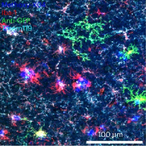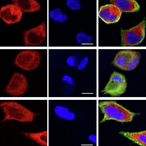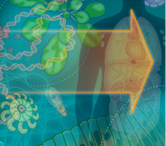Targeted activation of brain immune cells delays Alzheimer's processes
Study in an animal model shows how the brain's own immune cells react in Alzheimer's disease. Freiburg researchers identify an important signaling pathway. The study was published in Nature Neuroscience.
MoreMolecular arms race: How the genome defends itself against internal enemies
An international research team has deciphered a mechanism of evolutionary arms race in human cells.
MoreProf. Dr. Ibrahim Cissé elected EMBO member
Recognition for outstanding achievements in the life sciences for Max Planck Director and CIBSS researcher
MoreExtended funding for research training group "ProtPath"
The German Research Foundation (DFG) has approved funding for the establishment of two new research training groups and the extension of one existing research training group at the University of Freiburg.
MoreSimon Elsässer has been appointed as an Alexander von Humboldt Professor
Biochemist Prof. Dr. Simon Elsässer will receive five years of funding to strengthen and expand the key research area “Signals of Life” at the University of Freiburg.
MoreOpen Now: Recruitment of new cohort of Freiburg Rising Stars Academy
CIBSS invites PhD students and postdoctoral researchers worldwide to apply for collaborating with one of the CIBSS-host-PIs during a research stay in Freiburg.
Deadline for applications: 15 July 2025.
MoreCIBSS has acquired renewed funding to spearhead next-generation integrative signalling research at the University of Freiburg
On 22 May 2025, the Excellence Commission announced its positive funding decision for CIBSS. This major boost to biological signalling research reinforces CIBSS’s role as a leading centre for basic life science research and innovation.
MoreProf. Dr. Asifa Akhtar elected foreign member of the Royal Society
The CIBSS researcher and Max Planck Director has been selected for her scientific leadership in Germany and her research achievements.
MoreDies Universitatis: University Medal for Prof. Dr. Marco Prinz
At the Dies Universitatis, Rector Prof. Dr. Kerstin Krieglstein presented the University Medal to CIBSS researcher Marco Prinz and emphasised the forward-looking approach of the University of Freiburg in the context of the Excellence Strategy of the German federal and state governments and with regard to global challenges.
MoreProf. Dr. Claudia Jessen-Trefzer appointed Professor of Pharmaceutical Biology and Biotechnology
On 1 April 2025, CIBSS researcher Prof. Dr. Claudia Jessen-Trefzer was appointed Professor of Pharmaceutical Biology and Biotechnology.
More












